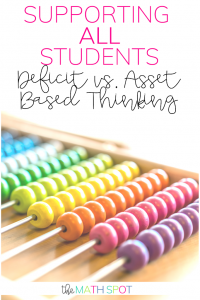A few years back I was talking with a colleague after a staff meeting. I mentioned that I had recently had a breakthrough with a student who had a multitude of “gaps” in their learning.
This student was in an upper elementary grade level but had a very early primary understanding in all subject areas. It was initially very overwhelming! Instead of thinking about all of the things the student didn’t know I instead started with what she did know and decided to use that strength and climb up from there.
My colleague let me know that there was an academic term for this switch. Where I had initially become overwhelmed by need I was in a “deficit” mindset related to the student. When I stopped and instead focused on what she did know I had switched to “asset-based thinking“.
It’s a simple swap with a BIG payoff!
Let’s look at how this mental shift can play out when deciding how to best support a student who isn’t yet showing proficiency on the math strategy of making a ten to add.
If I want a student to use this strategy they would solve a problem like 8+4 by thinking about how 8 + 2 makes a ten and then 2 more makes a total of 12.
There are SO MANY skills that go into this strategy!
- Knowing that addition means we are putting 8 and 4 together
- Knowing that numbers can be decomposed
- Knowing the partners of ten and that 8 + 2 makes a ten
- Knowing that 4 can be decomposed into 2 and 2
- Knowing that 8 + 2 + 2 will get the same result as 8 + 4
- Being able to carry out each of these decompositions
- Being able to successfully put numbers together
In deficit thinking, we might approach this problem by saying
“I have a student who can’t use the make a ten strategy. I used blocks, I used number bonds- they just don’t get it!”
When practicing asset-based thinking I am going to break this skill down and start with what my student DOES know… and move on from there!
Continuing with the hypothetical, problem solving with an asset-based mindset may sound like this.
“I know my student is able to add two numbers together by counting-on. They also know all of their partners of ten. My student has a lot of the skills that are needed to use this strategy- let’s keep building! The next step is being able to decompose single-digit numbers but they aren’t fluent yet. No wonder blocks and number bonds didn’t work- we are missing a foundational skill! I will work with this student on decomposing numbers to ten because that is the next skill they are ready for.”
The next time you have a student who seems stuck, don’t worry about all of the things they don’t know. Break the skill down, notice what your student is able to do and work off of that strength to take the single next step!
Pin For Later:





